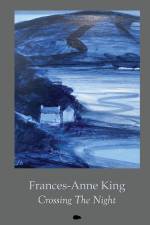av Frances-Anne King
181
The poems in this selection reach into the ungraspable realm of the human psyche, our own 'hidden constellations'. Charged with mystery and wonder, they explore the possibility of life being written 'into the white hot revelations' of stars; the hidden territory into which paintings lure you; the power of dreams to magnify and distort. Lyrically aware of the natural world, they are haunted by ecological loss and disaster, wondering how a post- apocalyptic people would remember earth when it is considered 'weakness to look back'. Mourning the futility of war they envision 'a land where the oak and the pomegranate intertwine' and look ultimately to the hope that lies in new life."In Crossing the Night Frances-Anne King trains her visionary, art-lover's gaze onto outer worlds of past, present and future to show how they shape and reflect inner worlds. We see a cloud brachiosaurus 'loping the sky's vast plain', a child 'whose kingdom was an oak wood' now a young man lost to the war and his mother who has only the quilt she has sewn him to bury on the Welsh hillside, the settlers of the Red Planet who are only allowed to dream of the Earth they once loved. Physical, philosophical, architectural, alive with startling imagery and often intensely moving, Crossing the Night is full of wonder. I read it several times with astonishment and admiration."Jenny Lewis"Frances-Anne King's poetry is already known and loved for its lyrical tenderness towards friends and strangers, unregarded creatures and distant stars, ruined civilisations and modern cities, the near and the far. In this pamphlet, she shows us how deeply she also cares about the 'hidden constellations' of the human heart, the 'unmapped territory' of human love in all its forms. The language is still lyrical but it has acquired an elegiac directness which accords with the poet's sense that 'our light is brief'. Even a fleeting dream can 'leave you wounded for days', while an awareness of the world's fragility grows and grows into 'the hidden apprehension-blossom'. And yet the poet holds out the promise of hope, frail as a flower, bright as a star, for us to contemplate and take our own comfort from."Lesley Saunders

